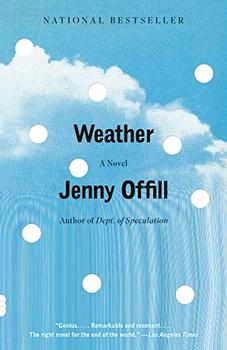Summary | Excerpt | Reading Guide | Reviews | Beyond the book | Read-Alikes | Genres & Themes | Author Bio

A Novel (Seasonal Quartet)
by Ali Smith"God was dead; to begin with." This first sentence of Winter perfectly sets up the dreamy journey Ali Smith is about to take her readers on; it's going to be strange (a disembodied head features heavily in the opening chapter), heavily influenced by the literature of the past (that first line is a play on the opening of Dickens' A Christmas Carol), and will, above all, make you question your perceptions of the world.
On the surface, Winter is an absurdly simple story. In a small English village, Sophia Cleves is readying for her long-absent son, Art, to return home from London for the Christmas holidays with his girlfriend, Charlotte. However, unbeknownst to Sophia, Art and Charlotte have recently gone through an ugly break-up involving Charlotte's hacking and subsequent take-over of Art's nature-themed Twitter account. Not wanting to disappoint Sophia, Art hires a stranger, Lux, to come home with him for the holidays and pretend to be his girlfriend. Unsurprisingly, all does not go according to plan.
Part of a series of novels Smith is writing called the Seasonal quartet, Winter, following 2016's Autumn, examines the repercussions of larger events. While Autumn focuses primarily on Brexit, Winter discusses the ensuing immigration crisis through Sophia's interactions with Art's "girlfriend," Lux, who it is revealed has recently immigrated to the United Kingdom.
Winter is more than the sum of its plot points. Smith uses her characters and their actions to subtly dig at issues both political and personal. Though these are weighty topics, Smith uses her small-frame story to handle them in a manageable and more realistic way. Sophia, a self-made woman, prides herself on being able to see clearly and having always made the right choices in life, especially in comparison to her sister, Iris, who has spent much of her life protesting the world's injustice at the expense of any tangible financial accomplishment.
However, the emphasis Sophia places on material wealth leaves her unsympathetic to the immigration crisis, without any responsibility or empathy towards people who, as she sees it, have not earned their place in her country. Once she learns of Lux's recent immigration, Sophia changes her attitude towards her, referring to her as "that foreigner" and no longer by name. She fails to recognize the much larger problems that the new limitations on future immigration will have for Lux, because she is blinded by how it will affect her. Smith utilizes the interactions between Lux and Sophia to point out the inherent prejudices that lie dormant in people until a situation forces them to the surface. In a beautiful passage, Smith sums up the exodus of refugees towards the United Kingdom, and other first-world countries, by equating the emigrants to birds, "What can I say? The world is full of people looking for meaning in that shape of a bird not native to this country turning up in this country after all."
I wouldn't be able to do justice to Winter, or any Ali Smith book, for that matter, without discussing the glorious writing style. Her love for words and literature seeps through the pages of everything she writes. Smith is fascinated by the roots of words, the ways that we perceive them and how we inadvertently change their meaning. In one passage, Smith deconstructs the word "today," wondering why it's not "to-day" and influences our understanding of it. Similarly, Smith is clearly heavily influenced by past works of fiction. Winter makes many allusions to other great works of literature such as A Christmas Carol, Shakespeare's Cymbeline, and even Paddington (see 'Beyond the Book'). The belief that the present cannot exist without looking to the past is embedded into the very writing itself; The sections of the novel taking place in the past are narrated in the present tense, and those taking place in the present in the past tense.
Though the Seasonal Quartet is classified as a series, it is really more a group of singular works connected by similar themes. As the story closes, the questions and ambiguities it brings up linger: "A coming back of light was at the heart of midwinter, equally as much as the waning of light." Winter will leave its readers with a faith in their ability to make their own brighter future.
![]() This review was originally published in The BookBrowse Review in March 2018, and has been updated for the
October 2018 edition.
Click here to go to this issue.
This review was originally published in The BookBrowse Review in March 2018, and has been updated for the
October 2018 edition.
Click here to go to this issue.

If you liked Winter, try these:

by Camilla Barnes
Published 2025
An often hilarious, surprisingly moving portrait of a long-married couple, seen through the eyes of their wickedly observant daughter—for fans of A Man Called Ove and The Royal Tenenbaums.

by Jenny Offill
Published 2021
From the author of the nationwide bestseller Dept. of Speculation--one of the New York Times Book Review's Ten Best Books of the Year--a shimmering tour de force about a family, and a nation, in crisis.
Happiness makes up in height for what it lacks in length.
Click Here to find out who said this, as well as discovering other famous literary quotes!
Your guide toexceptional books
BookBrowse seeks out and recommends the best in contemporary fiction and nonfiction—books that not only engage and entertain but also deepen our understanding of ourselves and the world around us.